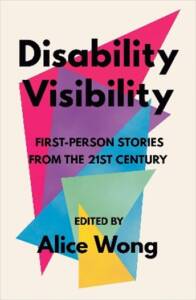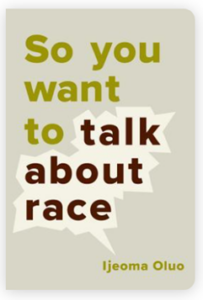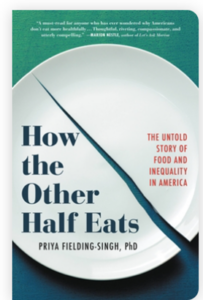Resources from ABIDE Monthly Gatherings
Home / ABIDE / Resources from Monthly Gatherings
Use the following toggles to view the resources compiled from our ABIDE Monthly Gatherings.
- Miami Nation in Indiana video
- Native Land Maps
- Boarding Schools in Indiana
- Zikala Sa History (she was profiled in the Indiana boarding schools video above)
- Racial Wealth Snapshot of Native Americans
- “Poverty Porn”
- IN.Gov webpage on Native American culture
- Eiteljorg Museum
September 2023: Lecture by & conversation with How the Other Half Eats author Dr. Priya Fielding-Singh, presented by Indy Hunger Network
 Disability Visibility: First-Person Stories from the Twenty-first Century by Alice Wong (Editor)
Disability Visibility: First-Person Stories from the Twenty-first Century by Alice Wong (Editor)
“This anthology gives a glimpse into the rich complexity of the disabled experience, highlighting the passions, talents, and everyday lives of this community. It invites readers to question their own understandings. It celebrates and documents disability culture in the now. It looks to the future and the past with hope and love.”
Here are some more optional resources to aid in your participation:
- Check out the book’s discussion guide and plain language summary
- Listen to an excerpt from the book (6 mins)
- Read an interview with Alice Wong here and here
Alice Wong has a podcast called Disability Visibility – you can browse episodes here
Essays in Disability Visibility recommended by staff
Part 1: Being
- The Isolation of Being Deaf in Prison, by Jeremy Woody, as told to Christie Thompson
- p59-62
- audiobook version: 1:24:39-1:31-45
- I’m Tired of Chasing a Cure, by Liz Moore
- p75-81
- audiobook version: 1:53:48-2:07:45
Part 2: Becoming
- Radical Visibility: A Disabled Queer Clothing Reform Movement Manifesto, by Sky Cubacub
- p90-100
- audiobook version: 2:17:22-2:41:10
- Guide Dogs Don’t Lead Blind People. We Wander as One, by Haben Girma
- p101-103
- audiobook version: 2:41:11-2:46:51
- Nurturing Black Disabled Joy, by Keah Brown
- p117-120
- audiobook version: 3:15:51-3:23:01
- Selma Blair Became a Disabled Icon Overnight. Here’s why We Need More Stories Like Hers, by Zipporah Arielle
- p141-145
- audiobook version: 4:01:22-4:12:19
Part 3: Doing
- So. Not. Broken, by Alice Sheppard
- p164-167
- audiobook version: 4:41:15-4:47:20
- note: consider reading this after reading The Beauty of Spaces Created for and by Disabled People, below, in which s.e. smith describes watching Alice Sheppard perform
- Falling/Burning: Hannah Gadsby, Nanette, and Being a Bipolar Creator, by Shoshana Kessock
- p179-188
- audiobook version: 5:07:19-5:28:25
- On NYC’s Paratransit, Fighting for Safety, Respect, and Human Dignity, by Britney Wilson
- p205-219
- audiobook version: 5:59:17-6:27:58
- Gaining Power through Communication Access, by Lateef McLeod
- p220—226
- audiobook version: 6:27:59-6:38:57
Part 4: Connecting
- To Survive Climate Catastrophe, Look to Queer and Disabled Folks, by Patty Berne, as told to and edited by Vanessa Raditz
- p232-235
- audiobook version: 6:45:03-6:52:32
- The Beauty of Spaces Created for and by Disabled People, by s.e. smith
- p271-275
- audiobook version: 7:51:37-8:01:15
- note: consider reading So. Not. Broken, by Alice Sheppard, above, who choreographed and performed the work described
 “In this New York Times bestseller, Ijeoma Oluo offers a hard-hitting but user-friendly examination of race in America. Widespread reporting on aspects of white supremacy – from police brutality to the mass incarceration of Black Americans – has put a media spotlight on racism in our society. Still, it is a difficult subject to talk about. How do you tell your roommate her jokes are racist? Why did your sister-in-law take umbrage when you asked to touch her hair – and how do you make it right? How do you explain white privilege to your white, privileged friend?
“In this New York Times bestseller, Ijeoma Oluo offers a hard-hitting but user-friendly examination of race in America. Widespread reporting on aspects of white supremacy – from police brutality to the mass incarceration of Black Americans – has put a media spotlight on racism in our society. Still, it is a difficult subject to talk about. How do you tell your roommate her jokes are racist? Why did your sister-in-law take umbrage when you asked to touch her hair – and how do you make it right? How do you explain white privilege to your white, privileged friend?
In So You Want to Talk About Race, Ijeoma Oluo guides readers of all races through subjects ranging from intersectionality and affirmative action to “model minorities” in an attempt to make the seemingly impossible possible: honest conversations about race and racism, and how they infect almost every aspect of American life.”
(from IndyPL website)
Listen: WAMC Northeast Public Radio short interview with the author (23 minutes)
Read: NPR interview with the author
Read: the actual book! (available in the ABIDE library, plus copies available via the IndyPL)
 A fascinating look at dietary differences along class lines, revealing that lack of access to healthy food is far from the primary driver of nutritional inequality in America.
A fascinating look at dietary differences along class lines, revealing that lack of access to healthy food is far from the primary driver of nutritional inequality in America.
Inequality in America manifests in many ways, but perhaps nowhere more than in how we eat. From her years of field research, sociologist and ethnographer Priya Fielding-Singh brings us into the kitchens of dozens of families from varied educational, economic, and ethnoracial backgrounds to explore how—and why—we eat the way we do. We get to know four families intimately: the Bakers, a Black family living below the federal poverty line; the Williamses, a working-class white family just above it; the Ortegas, a middle-class Latinx family; and the Cains, an affluent white family.
Packed with lyrical storytelling and groundbreaking research, as well as Fielding-Singh’s personal experiences with food as a biracial, South Asian American woman, How the Other Half Eats illuminates exactly how inequality starts on the dinner plate. Once you’ve taken a seat at tables across America, you’ll never think about class, food, and public health the same way again.
- listen to this podcast (33 minutes)
- Read this article about the book
